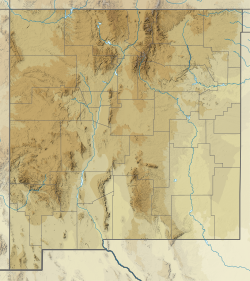| Tucumcari Formation | |
|---|---|
| Stratigraphic range: Albian PreꞒ Ꞓ O S D C P T J K Pg N | |
| Type | Formation |
| Underlies | Mesa Rica Sandstone |
| Overlies | Morrison Formation |
| Lithology | |
| Primary | Shale |
| Other | Sandstone |
| Location | |
| Coordinates | 35°07′59″N 103°42′30″W / 35.1329442°N 103.7083319°W / 35.1329442; -103.7083319 |
| Region | New Mexico |
| Country | United States |
| Type section | |
| Named for | Mount Tucumcari |
| Named by | Dobrovolny and Summerson |
| Year defined | 1947 |
  | |
The Tucumcari Formation is a geologic formation in New Mexico. It preserves fossils dating back to the Albian Age of the early Cretaceous period.
Description
The formation consists of highly fossiliferous gray shale and buff calcareous sandstone with some limestone nodules. It overlies the Morrison Formation and is overlain by the Mesa Rica Sandstone.
The formation is interpreted as marine shales deposited during the Kiowa-Skull Creek transgression. It is likely the lateral equivalent of the Glencairn Formation.
Fossils
More than 65 marine invertebrate species have been found in the Tucumcari Shale. The macrofossils are mostly bivalves, with some gastropods and ammonoids. Microfossils include ostracods, foraminiferans, and palynomorphs. Species found in the formation include the solitary corals Desmophyllum and Platycyathus, the bivalves Scabrotrigonia, Pteria, Texigryphaea, Botula, and Lopha, and gastropod Turritella. The shells show borings from clionid sponges and acrothoracic barnacles.
History of investigation
The unit was first described by Jules Marcou in 1858 as Bed E of the Pyramid Mountain section. In 1892, W.F. Cummins described the Jurassic and Cretaceous section at Tucumcari Mountain as the "Tucumcari beds". Dobrovsky and Summerson assigned the unit to the Purgatoire Formation as the Tucumcari Shale Member in 1947. Griggs and Read abandoned the Purgatoire Formation in southeastern New Mexico and raised the Tucumcari Shale to formation rank in 1959.
See also
Footnotes
- ^ Dobrovolny & Summerson 1947.
- ^ Griggs & Read 1959.
- ^ Kues et al. 1985.
- Holbrook & Dunbar 1992.
- Scott et al. 2004.
- Marcou 1858.
- Cummins 1892.
References
- Cummins, W.F. (1892). "Notes on the geology of the country west of the plains". Geological Survey of Texas. 3: 201–223.
- Dobrovolny, Ernest; Summerson, C.H. (1947). "Geology of northwestern Quay County, New Mexico". U.S. Geological Survey Oila Nd Gas Investigations Map. OM-62. doi:10.3133/om62.
- Griggs, R.L.; Read, C.B. (1959). "Revisions in Stratigraphic Nomenclature in Tucumcari-Sabinoso Area, Northeastern New Mexico: GEOLOGICAL NOTES". AAPG Bulletin. 43 (8): 2003–2007. doi:10.1306/0BDA5E8E-16BD-11D7-8645000102C1865D.
- Holbrook, John M.; Dunbar, Robyn Wright (1 July 1992). "Depositional history of Lower Cretaceous strata in northeastern New Mexico: Implications for regional tectonics and depositional sequences". GSA Bulletin. 104 (7): 802–813. Bibcode:1992GSAB..104..802H. doi:10.1130/0016-7606(1992)104<0802:DHOLCS>2.3.CO;2.
- Kues, Barry S.; Lucas, Spencer G.; Kietzke, Kenneth K.; Mateer, Niall J. (1985). "Synopsis of Tucumcari Shale, Mesa Rica Sandstone, and Pajarito Shale paleontology, Cretaceous of east-central New Mexico" (PDF). New Mexico Geologic Society Field Conference Guidebook. 36. Retrieved 7 August 2020.
- Marcou, Jules (1858). Geology of North America, with two reports on the prairies of Arkansas and Texas, the Rocky Mountains of New Mexico, and the Sierra Nevada of California, originally made for the United States Government. Zurich: Zurcher and Furrer. Retrieved 16 September 2020.
- Scott, R.W.; Holbrook, J.M.; Oboh-Ikuenobe, F.E.; Evetts, M.J.; Benson, D.G.; Kues, B.S. (April 2004). "Middle Cretaceous stratigraphy, southern Western Interior Seaway, New Mexico and Oklahoma". The Mountain Geologist. 41 (2): 33–61. Retrieved 8 September 2020.